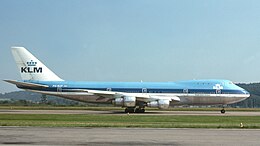Tenerife airport disaster
The Tenerife airport disaster happened on March 27, 1977, when two Boeing 747s collided on the ground of Los Rodeos Airport (now Tenerife North Airport), killing 583 people.
 Wreckage on the runway | |
| Accident | |
|---|---|
| Date | March 27, 1977 |
| Summary | Runway collision due to miscommunication and pilot error |
| Site | Tenerife, Canary Islands 28°28′54″N 16°20′18″W / 28.48165°N 16.3384°W |
| Total fatalities | 583 |
| Total injuries | 61 |
| Total survivors | 61 |
| First aircraft | |
 PH-BUF, the KLM Boeing 747-206B involved in the accident, at Amsterdam Schiphol Airport in May 1975. | |
| Type | Boeing 747-206B |
| Name | Rijn ("Rhine") |
| Operator | KLM Royal Dutch Airlines |
| IATA flight No. | KL4805 |
| ICAO flight No. | KLM4805 |
| Call sign | KLM 4805 |
| Registration | PH-BUF |
| Flight origin | Amsterdam Airport Schiphol Netherlands |
| Destination | Gran Canaria Airport Gran Canaria, Canary Islands |
| Passengers | 234 |
| Crew | 14 |
| Fatalities | 248 (all) |
| Injuries | 0 |
| Survivors | 0 |
| Second aircraft | |
 N736PA, the Pan Am Boeing 747-121 involved, 22 days before the accident. | |
| Type | Boeing 747-121 |
| Name | Clipper Victor |
| Operator | Pan American World Airways |
| IATA flight No. | PA1736 |
| ICAO flight No. | PAA1736 |
| Call sign | CLIPPER 1736 |
| Registration | N736PA |
| Flight origin | Los Angeles International Airport Los Angeles, United States |
| Stopover | John F. Kennedy International Airport, New York City, U.S. |
| Destination | Gran Canaria Airport Gran Canaria, Canary Islands |
| Passengers | 380 |
| Crew | 16 |
| Fatalities | 335 |
| Injuries | 61 |
| Survivors | 61 |
The crash killed all 248 in the KLM aboard and 335 of the 396 people in the Pan Am aboard.
Accident
changeThe KLM captain wanted to takeoff quickly so that he could return to Amsterdam as soon as possible. Because of a radio heterodyne, this made him misunderstand a partly garbled transmission into thinking that he was cleared by the Air Traffic Controller to takeoff, and so he began his takeoff roll, not knowing that the Pan American 747 was still on the runway..[1] At that time, the Tenerife North Airport did not have ground radar, so the controllers could not know that the KLM flight was taking off.[2]
Another reason was the fog surrounding the airport. The bad weather reduced the visibility, meaning both pilots and the controllers could not see. Because of the fog, the pilots only saw each other at the last minute, when prevention of the crash was impossible. If there was no fog, the KLM crew would have seen the Pan Am plane on the runway and would not have taken off.[2]
During the takeoff roll of KLM 4805, the crew of the Pan Am radioed that they were still taxiing down the runway. The KLM flight crew heard this and asked themselves if the Pan American was still on the runway, to which the captain then replied "oh yes".
A few seconds later, the crew of both aircraft spot each other, the captain of the Pan Am exclaiming, "there he is, that goddamn son of a bitch is coming, he's coming", and "get off, get off, get off", said the co-pilot, as full thrust was applied in an attempt to get his aircraft off the runway out of the way of the oncoming KLM.
In an attempt to leave the ground before collision, the captain rotates his aircraft, causing a tailstrike that lasts a few hundred feet. Just as the KLM leaves the ground, both 747s collide and explode, dealing major damage to the almost stationary Pan Am airplane. The KLM, without engines and main landing gear, descends back down to the runway and crashes, skidding along the pavement exploding, and engulfed in flames, killing all 248 people on KLM aboard whilst 335 of 396 people on Pan American aboard.
It was the deadliest aviation accident in history within more than 500 deaths whilst Japan Airlines Flight 123, a 1985 single airplane crash also with more than 500 deaths, as the deadliest aviation accident in a single aircraft history.[3]
References
change- ↑ "ASN Aircraft Accident Boeing 747-121 N736PA Tenerife-Norte Los Rodeos Airport (TFN). Archived 2011-04-02 at the Wayback Machine" Aviation Safety Network. Retrieved April 7, 2014.
- ↑ 2.0 2.1 Mayday, Crash of the Century (Special). Cineflix, 2006.
- ↑ "Aviation Safety Network > Statistics > Worst accidents > 100 worst accidents. Archived 2014-02-22 at the Wayback Machine" Aviation Safety Network. Retrieved April 7,